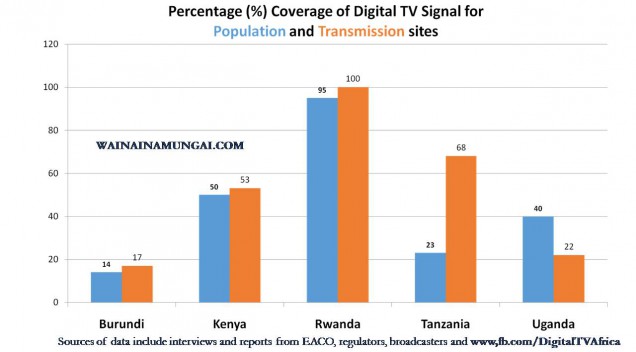by Wainaina Wa Mungai · 21st January 2015
With all the undesirable activity surrounding the Digital Migration process in Kenya, I have been hesitant to comment. However, as a former Chairman of the Assembly of Broadcasting Operators in EACO, it has escalated to a call of duty. I start by recognising that the Director General of Communications Authority is under obligation to be the firm referee in ending the confusion caused by an unproductive confrontation between stakeholders. Even where we may differ on certain aspects of the regulatory action, the CA has today played its role in a decisive manner.
It should therefore become clear to Kenyan broadcasters that they need to develop Policy Engagement and Regulatory Compliance roles within their organisational structures. Not to rely on fire fighting or litigation. I have severally advised that not every dispute needs to end up in litigation or degenerate to the level of unproductive contests we are being treated to in these Digital Migration disputes. We must endevour to resolve issues in the Boardroom – not the Court Room. Litigation by broadcasters is growing into a business risk issue and, on many occassions, the outcome has proved counterproductive.
Regional Broadcasters have had valid concerns which I raised on their behalf within EACO East Africa broadcasters raise concern over StarTimes, digital migration, local content . In June 2014, at the EACO Assemblies in Arusha, broadcasters passed Agreements that clearly stated that Free to Air content should remain free on all Set Top Boxes. In the interest of fairness, questions remain on how PayTV providers who subsidise set top boxes to as low as 200/- are meant to recover the custimers who received subsidised boxes fail to pay subscriptions yet continue to receive FTA.
Many of these battles in Kenya’s broadcasting subsector point to weakened engagement approaches either due to inability to strategize or unwillingness to comply with regulation. For instance, why would the obviously unethical advertisements run before Type-Approval of the STB/decoder had been obtained? Why would an infomercial be obsessively and repeatedly played against PayTV operators who are potential advertising clients and business partners who also deliver Free to Air channels on their Free to Air decoders?
The media in Kenya has for long underutilised the many channels of negotiation as relates to Policy and Regulation. They have historically been absent from public forums and multistakeholder processes such as the National ICT Policy development process. The broadcasters have been habitually late in presenting their comments to National Spectrum Policy, Communication Bills and various sector Regulations. They have prefered instead to engage in the singular refrain about #PressFreedom and #MuzzlingThePress even in cases where ‘the shoe doesn’t fit’. The immediate response by media houses to the CA’s regulatory action has already began to take the same #FreedomOfthePress tone that repeatedly weakens their capacity to develop preventive mechanisms and less confrontational approaches to dispute resolution. The insistence on being “Kenyan investors” fighting foreign investors of any extraction speaks to the emotions and takes refuge in political messaging instead of resolving the underlying weaknesses in effective strategy and engagement.
Broadcaster in Kenya and the EACO region need to explore the possibility of using EACO resolutions to negotiate behind closed doors.
A win-win approach to the Digital Migration disputes earlier in the process would have seen Kenya lead the continent in adoting the new technology. In the spirit of fair competition, it was therefore not proper for traditional Kenyan broadcasters to have celebrated the cancellation of the PANG/Startimes licence by the Court of Appeal in mid 2014. An injustice against foreign investors was never going to address their concerns. The reversal of the decision by the Supreme Court in September 2014 further provided an opportunity for broadcasters to engage with the regulator (and all other stakeholders) in a win-win arrangement for their respective businesses and for the country. There are many players in the Digital TV space who hope for an end to these perennial disputes whose origins and motivation do not seize to confound. The stakeholders include importers of set top boxes, new Digital TV stations such as 3Stones TV and many others whose views are seemingly disregarded by the Consortium of 3 broadcasters.
May this be the beginning of a new chapter in Kenya’s broadcasting sector – an opportunity to heal old wounds suffered under past regimes and an appreciation of the strategic value of the Boardroom as opposed to the Court Room. Let the broadcasters put aside the characteristic hardline approach informed by their dominant position in Analogue broadcasting and revive positive engagements with the regulator and all other stakeholders as was proposed by the Supreme Court.

